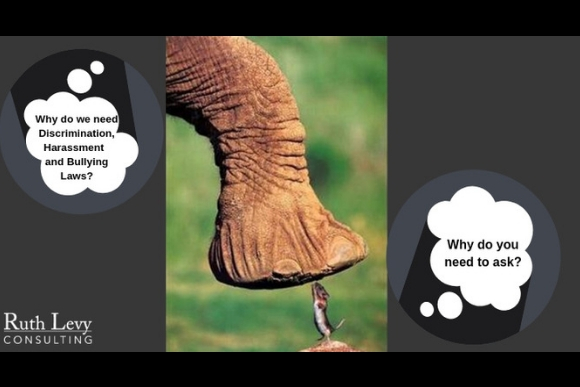How do you know if you might offend someone?

To make sense of our experience, it is human nature to think in polarities – right/wrong, good/bad, yes/no, night/day, sharp/blunt, close/far, scarcity/abundance, and so on. However this penchant to polarised thinking also limits our perceptions.
Unless something directly and personally impacts people, it is often harder for them to empathise with other people’s experiences.
25 years’ ago I started providing workplace training on the topic: Preventing and Responding to Discrimination, Harassment and Bullying. My first audience in those days was a large group of white male professionals between the ages of 50 – 65 in a male-dominated industry. In those days, I was even asked the question, “Why do we need this training?” Another comment was, “You’re just ruining our fun at work.”
In response to this, I designed the photo of this article as a slide in my training material and ask “Who is the elephant?” Of course, I get a number of responses such as, “my boss”, “the bully” and sometimes someone jokes and says “my wife”.
To help people understand the importance of empathising with others, even if not directly impacted by something, I provide a number of scenarios relating to age, sexuality, race, disability, etc. and ask the audience if the comments offend them? And of course, even in a homogenous group, there are always people who are personally impacted by the enormous challenges of supporting a partner of a different race, a child with a disability, a transgender friend …
Another scenario is asking whether it’s okay to ask a work colleague out on a date? Most people’s immediate reaction to this is that it’s okay, provided the person doesn’t keep asking you out once you’ve said “no”. However, when the scenario is changed – “your daughter is 18 years old, has just started her first job and is 6 weeks into her probationary period. She comes home in tears because her boss has just asked her out on a date.” Suddenly the perspective changes. The boss is abusing his position of power over a person in a vulnerable position and asking your daughter out, even once, is unacceptable.
When behaviour is not blatantly discriminatory, harassing or bullying, people may struggle to understand ‘where the line is’ regarding whether they may or may not be offending another. The answer is – we don’t always know.
The point of the powerpoint slide is that in every scenario, the person who is the elephant and the person who is the mouse keeps changing. If people can appreciate that even though they might not be offended by something, someone else could be, the seeds of empathy are planted.
If someone is gutsy enough to speak up and tell you that they are offended by your jokes or behaviour, instead of reacting defensively and responding “you’re being too sensitive”, a far better response is “I’m sorry, I didn’t realise” and to then respect their feelings on an ongoing basis

